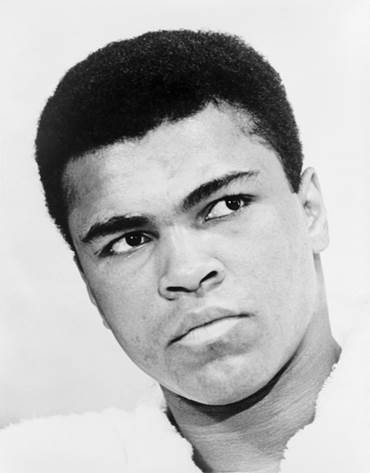
Rowan prof recounts life of Muhammad Ali for Black History Month

Growing up in Lexington, Kentucky, Cassis Clay faced discrimination as a Black man living in the segregated South.
As the heavyweight boxing champion later known as Muhammad Ali, he was stripped of his title and faced a five-year prison sentence for his refusal to be drafted during the Vietnam War.
“I ain’t got no quarrel with those Viet Cong; they never called me (n word),” Ali told the press of his conscientious objector status, according to Malik Abdul-Jabbaar. The professor hosted a lecture for Black History Month – “The Life and Legacy of Muhammad Ali” – on Feb. 14 at Rowan College at Burlington County.
“Ali was ‘the greatest,'” noted Abdul-Jabbaar, who teaches communications and humanities at the college. “Not only was he great in the ring, but also so great out of the ring on topics of religion, race, sports and culture.”
The former Cassius Clay became an amateur boxer in 1954 after someone stole his bicycle. He told a police officer then, “I’m going to whip whoever took my bike.” The officer happened to be a boxing trainer who asked the youth: “Do you know how to box?”
Clay soon learned. He lost his first amateur fight, then kept winning. As an 18-year-old in 1960, he won the light heavyweight gold medal during the Olympics in Rome, the professor recounted, adding that Ali’s charismatic personality shined.
“He was the mayor of the Olympic Village. It was a glorious time for him – a celebration,” Abdul-Jabbaar observed.
But on his return home from the games, harsh reality reared its ugly head. Clay went into a restaurant and was told, “We don’t serve (n word)s.”
“Ali was so hurt and frustrated that he threw his gold medal into the Ohio River,” the professor said.
But as a professional, the young Clay started winning every fight.
“He was not a traditional boxer,” Abdul-Jabbaar explained. “He held his hands low and was so quick. He was so gifted, that the technical mistakes didn’t matter.”
Clay earned a shot at the heavyweight title against the fearsome Sonny Liston in 1964. A 7-1 underdog, he went on to win, boasting, “I shook up the world. I am a bad man.”
A few days later, against the advice of friends, Clay announced that he had changed his name to Muhammad Ali and was a member of the Nation of Islam.
“He became one of the most hated persons in the country,” Abdul-Jabbaar recounted, adding that Ali was savagely criticized by sportswriters of the time. But the boxer stuck to his beliefs: It was then that he refused the draft.
“He was banned from boxing,” Abdul-Jabbaar said. “He faced five years in prison, a $10,000 fine and his passport was revoked so he couldn’t fight overseas.”
Ali’s response? “Our fight is here,” he insisted, meaning his own country.
The press called him a simplistic fool. Promoter Bob Aron organized the Cleveland Summit of 1967 – including football player Jim Brown and basketball players Lew Alcindor (later Kareem Abdul-Jabbar) and Bill Russell – to convince Ali to join the Army.
“When they realized he wasn’t going to change his mind, it was flipped,” explained the professor. “At the time, Russell had said of Ali, ‘He has an absolute and sincere faith.'”
Appeals of Ali’s prison sentence followed, and the case went all the way to the Supreme Court. At first, the justices voted 5-3 to uphold Ali’s conviction, but then reconsidered after a law clerk cited cases of previous conscientious precedents. The justices then voted 8-0 for acquittal.
Ali – who briefly lived in Cherry Hill – returned to boxing, and in 1971, he lost the heavyweight title to Joe Frazier in what was called the Fight of the Century at New York’s Madison Square Garden. Three years later, he reclaimed the heavyweight title by defeating George Foreman in what became known as the Rumble in the Jungle in Zaire, Africa, where he was flocked by fans wherever he went.
“Ali has become the most famous man in the world and wanted to take the fight internationally,” Abdul-Jabbaar explained. “He was beloved to people all around the world.”
But years of boxing took their toll on “the greatest.”
“He stayed around too long. His speech slowed down,” Abdul-Jabbaar said of Ali. “This once young, bright and sharp speaker was diagnosed with Parkinson’s syndrome, which the doctors said was from boxing. He went out of the public eye.”
Yet Ali managed one more comeback at the 1996 Olympics in Atlanta.
“No one knew who was going to bring the torch,” Abdul-Jabbaar pointed out. “Ali comes out, his hands shaking [from] the syndrome, and lights the Olympic torch. He went on to be an ambassador of the world.
“He became a grandfather figure,” the professor added. “People forgot about the past, and he was beloved.”
Ali died on July 3, 2016.


